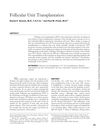 29 citations,
January 2019 in “Journal of the European Academy of Dermatology and Venereology”
29 citations,
January 2019 in “Journal of the European Academy of Dermatology and Venereology” Trichoscopy is useful for diagnosing and monitoring systemic lupus erythematosus, with certain hair and scalp changes indicating more active disease.
 3 citations,
August 2017 in “PubMed”
3 citations,
August 2017 in “PubMed” A man got a scalp infection from synthetic hair implants because the procedure wasn't done by a doctor and was poorly managed.
March 2024 in “Nutrients” Alopecia Areata is linked to specific gut bacteria and metabolites, indicating a complex gut microbiome.
 January 2024 in “American journal of clinical dermatology”
January 2024 in “American journal of clinical dermatology” Ritlecitinib is safe and well-tolerated for treating alopecia areata in patients aged 12 and older.
 11 citations,
February 2021 in “Journal of Cosmetic Dermatology”
11 citations,
February 2021 in “Journal of Cosmetic Dermatology” Oral tofacitinib helped regrow hair in over half of the patients with severe alopecia, but relapses and side effects were common.
 16 citations,
July 2002 in “Australasian Journal of Dermatology”
16 citations,
July 2002 in “Australasian Journal of Dermatology” A woman with lupus experienced skin death due to a blood clotting disorder after stopping a blood thinner, which healed with treatment.
 10 citations,
July 2002 in “Australasian Journal of Dermatology”
10 citations,
July 2002 in “Australasian Journal of Dermatology” Careful management of blood thinners is crucial for lupus patients with APS.
 July 2002 in “Australasian Journal of Dermatology”
July 2002 in “Australasian Journal of Dermatology” Maintaining anticoagulation is crucial for patients with antiphospholipid syndrome.
 27 citations,
July 2018 in “Journal of optometry”
27 citations,
July 2018 in “Journal of optometry” Eyelashes protect the eyes, but more research is needed to understand how.
 21 citations,
May 2016 in “The Cochrane library”
21 citations,
May 2016 in “The Cochrane library” Topical minoxidil helps treat female pattern hair loss, but more research needed for other treatments.

New insights into cell communication in psoriasis suggest innovative drug treatments.
 17 citations,
October 2015 in “Medicine and Pharmacy Reports”
17 citations,
October 2015 in “Medicine and Pharmacy Reports” Animal models are crucial for learning about hair loss and finding treatments.
 April 2024 in “Frontiers in medicine”
April 2024 in “Frontiers in medicine” Alopecia Areata significantly lowers quality of life and current treatments are inadequate, highlighting a need for better therapies and standardized treatment protocols.
August 2024 in “Nutrients” Probiotics help reduce hair loss and increase hair growth in people with androgenic alopecia.
 November 2023 in “bioRxiv (Cold Spring Harbor Laboratory)”
November 2023 in “bioRxiv (Cold Spring Harbor Laboratory)” Disrupted cholesterol production impairs hair follicle stem cells, leading to hair loss.
 28 citations,
July 2002 in “Australasian Journal of Dermatology”
28 citations,
July 2002 in “Australasian Journal of Dermatology” Lupus can look like hair loss from alopecia areata but needs different treatment.
 July 2002 in “Australasian Journal of Dermatology”
July 2002 in “Australasian Journal of Dermatology” A woman with lupus had hair loss and skin issues that were successfully treated with medications.
 1 citations,
October 2023 in “Romanian Journal of Morphology and Embryology”
1 citations,
October 2023 in “Romanian Journal of Morphology and Embryology” COVID-19 can cause various skin issues, but long-term skin problems are rare.
 15 citations,
May 2011 in “Veterinary Dermatology”
15 citations,
May 2011 in “Veterinary Dermatology” Vitamin A might be a safe extra treatment for dogs with sebaceous adenitis, but more research is needed to prove its effectiveness.
 March 2023 in “Journal of clinical review & case reports”
March 2023 in “Journal of clinical review & case reports” Frontal Fibrosing Alopecia mainly affects postmenopausal Mexican women, requiring early detection to prevent permanent hair loss.

New treatments for hair loss should target eight main causes and use specific plant compounds and peptides for better results.
 99 citations,
December 2010 in “Journal of The European Academy of Dermatology and Venereology”
99 citations,
December 2010 in “Journal of The European Academy of Dermatology and Venereology” The document concludes that certain genetic mutations and dietary factors are involved in acne development, and treatments like isotretinoin and diet changes can help manage it.
 4 citations,
January 2022 in “Drug design, development and therapy”
4 citations,
January 2022 in “Drug design, development and therapy” Intramuscular corticosteroids are effective and safe for severe alopecia areata, with most patients regrowing hair, but nearly half may relapse.
 7 citations,
April 2015 in “Plastic and Aesthetic Nursing”
7 citations,
April 2015 in “Plastic and Aesthetic Nursing” Hair transplantation can effectively restore a natural-looking hairline when properly planned and executed.
 3 citations,
January 2000
3 citations,
January 2000 Some alternative therapies for vitiligo show promise but need more research.
4 citations,
January 2018 in “Journal of dermatology & dermatologic surgery” There is no gold standard treatment for hidradenitis suppurativa due to insufficient evidence.
 13 citations,
December 2016 in “PubMed”
13 citations,
December 2016 in “PubMed” People with a common type of hair loss have higher stress levels in their body, and treatments that reduce this stress could help.
 278 citations,
March 2013 in “Gut”
278 citations,
March 2013 in “Gut” Anti-IL-12/IL-23 antibody therapy effectively treats psoriasiform skin lesions in IBD patients.
 28 citations,
November 2008 in “Facial Plastic Surgery”
28 citations,
November 2008 in “Facial Plastic Surgery” Follicular Unit Transplantation (FUT) can give great results and patient satisfaction when done carefully and by a skilled surgeon.
 157 citations,
August 2010 in “Lupus”
157 citations,
August 2010 in “Lupus” The document concludes that recognizing and treating cutaneous lupus erythematosus early is crucial for managing the skin and potential systemic symptoms.


























